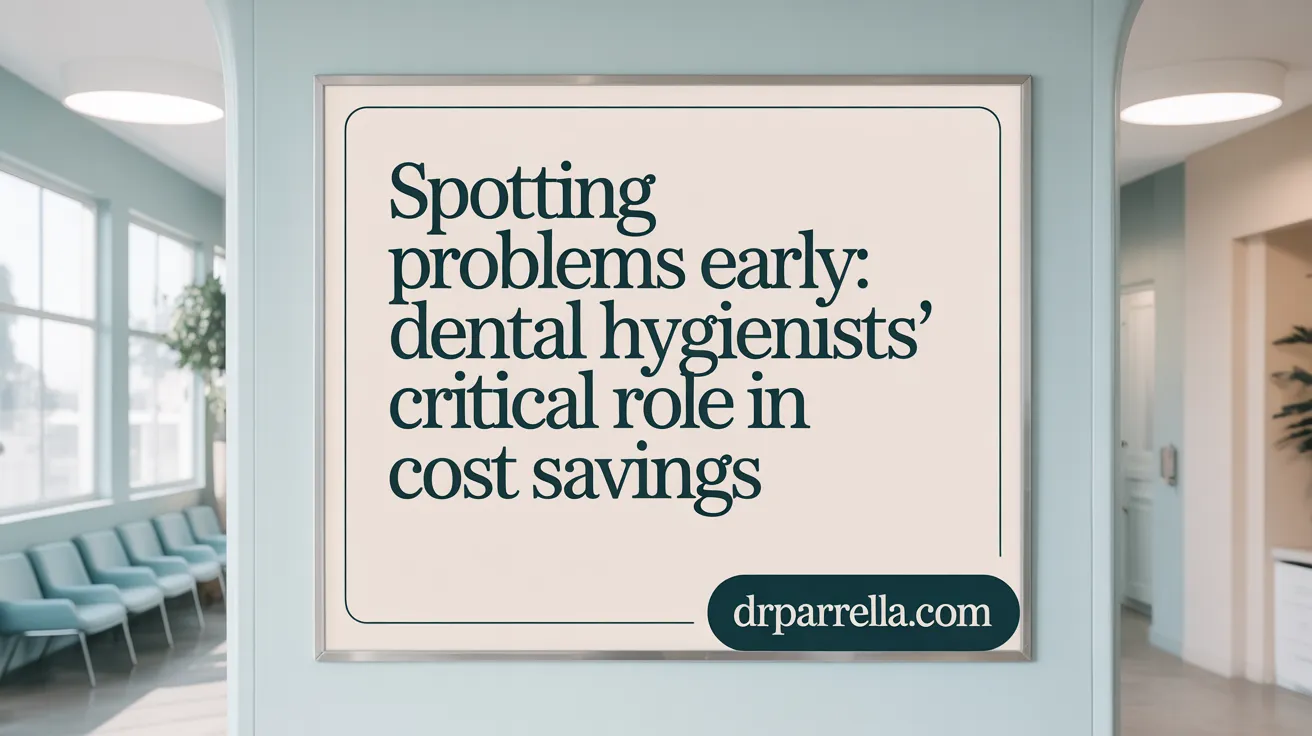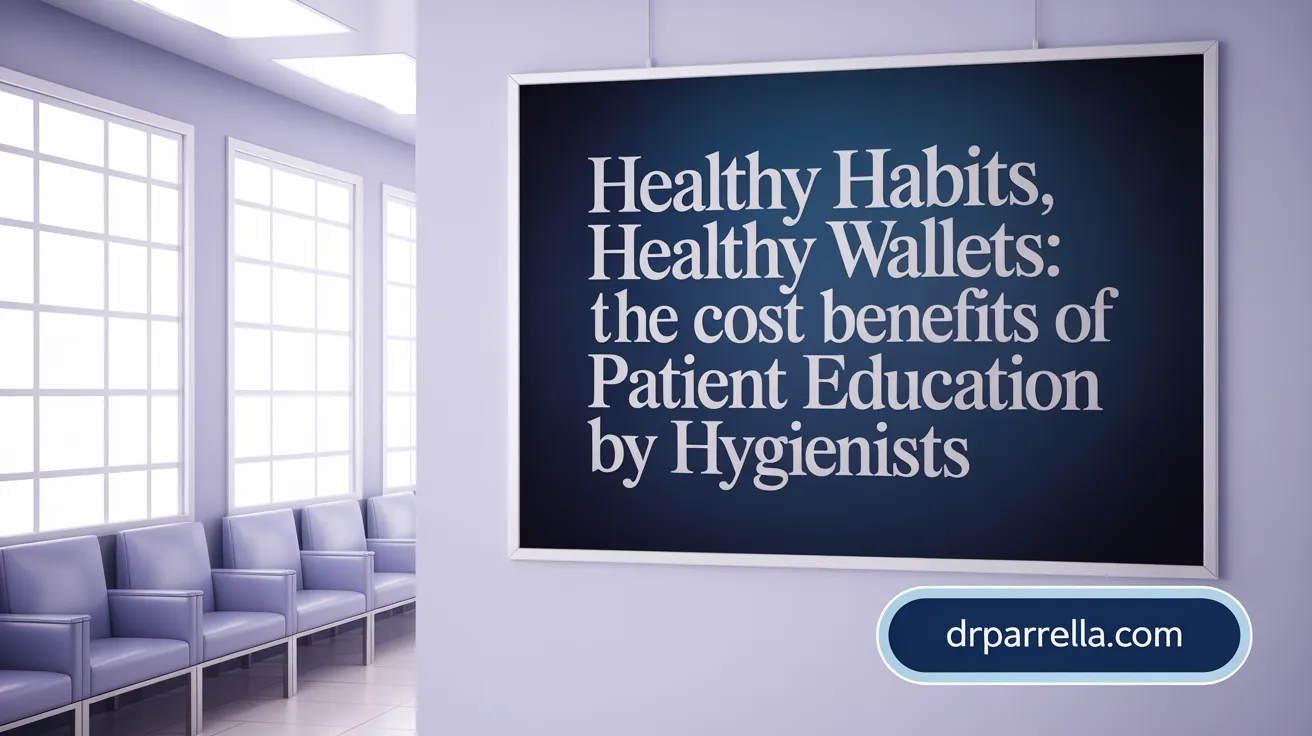Understanding the Crucial Role of Dental Hygienists in Preventive Care
Dental hygienists play a vital but often underestimated role in not only maintaining oral health but also in preventing costly dental and systemic treatments later in life. Through comprehensive patient education, early detection of oral and systemic diseases, and professional preventive services, dental hygienists help safeguard the long-term health and financial well-being of patients. This article explores how these skilled professionals contribute to better health outcomes and reduce expensive procedures by emphasizing prevention and collaboration within healthcare.
Early Detection and Prevention: The Frontline Defense Against Costly Dental Issues

How do dental hygienists help in early identification of dental problems that could become costly?
Dental hygienists are essential in spotting early signs of cavities, gum inflammation, and enamel damage during routine check-ups. Through thorough examinations and cleanings, they remove plaque and tartar that regular brushing and flossing cannot eliminate. This professional intervention significantly lowers the risk of oral diseases progressing unnoticed, reducing future dental treatment costs.
Education plays a pivotal role in prevention; dental hygienists guide patients on effective brushing and flossing techniques, alongside dietary advice to avoid harmful habits that contribute to dental decay and gum disease. By encouraging these oral hygiene best practices, they reduce the incidence of serious dental issues.
Early detection by hygienists helps circumvent the development of complex dental problems like root canals, deep periodontal cleanings, surgical interventions, or tooth extractions—saving patients discomfort and high treatment costs.
What preventive services do dental hygienists provide that help reduce future treatment costs?
Dental hygienists offer several preventive treatments critical in maintaining oral health and lowering future expenses. These include professional teeth cleanings, which remove harmful tartar and plaque buildup. They also apply fluoride treatments and sealants to strengthen enamel and shield teeth from decay.
Additionally, dental hygienists perform dental X-rays and screenings to identify early signs of gum disease and possible oral cancers, facilitating timely care. These preventive services effectively pause or slow disease progression, reducing the chance of needing costly and invasive restorative procedures later.
Why is maintaining periodontal health important for systemic disease prevention?
Regular periodontal assessments by dental hygienists not only protect oral health but also contribute to overall systemic health. Gum disease is closely linked to chronic conditions like diabetes and cardiovascular disease. By managing and preventing periodontal problems early, hygienists play a crucial role in reducing related systemic health risks.
This integrated approach helps improve patient outcomes beyond oral care, potentially lowering health care costs associated with diabetes complications and heart disease.
Through comprehensive preventive care and patient education, dental hygienists serve as the frontline defense, ensuring both healthier smiles and better overall health, while helping patients avoid costly dental procedures.
Dental Hygienists as Educators and Health Coaches: Empowering Patients for Long-term Savings

How do dental hygienists contribute to patient education and health coaching?
Dental hygienists play a pivotal role in educating patients about maintaining optimal oral hygiene best practices. They provide personalized instruction on effective brushing techniques, emphasizing brushing at a 45-degree angle with fluoride toothpaste to protect enamel and clean along the gumline. Flossing daily and cleaning the tongue are also taught to remove bacteria and food particles that brushing alone cannot reach.
Beyond hygiene, dental hygienists offer dietary advice to help patients reduce their intake of sugars and acidic foods, which contribute to tooth decay and enamel erosion. This counseling supports long-term oral health by minimizing the risk of cavities.
Lifestyle counseling by hygienists includes smoking cessation guidance, which is essential for preventing periodontal disease and oral cancers. These efforts not only target oral health but also address related systemic conditions such as cardiovascular disease, diabetes, and respiratory infections.
By coaching patients in these areas, dental hygienists foster behavior modification that encourages consistent, healthy practices. This empowerment results in fewer dental problems and systemic complications, ultimately leading to significant reductions in costly dental and medical treatments over time. Such educational and preventive care provided by hygienists underscores their vital role of dental hygienists in systemic disease prevention and dental hygienists as health coaches, emphasizing their contribution to improving overall patient health and reducing future healthcare expenses through benefits of regular hygienist visits.
Collaborative Care and Systemic Health: The Dental Hygienist’s Role Beyond the Mouth
How do dental hygienists contribute to preventing systemic health conditions?
Dental hygienists play an essential role of dental hygienists in systemic disease prevention by detecting early signs of systemic diseases that manifest in the oral cavity, such as diabetes and cardiovascular disease. Through thorough oral examinations and periodontal assessments, they identify inflammation and gum disease indicators which are linked to increased risks for heart disease and complications in pregnancy.
What is the significance of their collaboration with medical professionals?
Working as part of an interdisciplinary healthcare collaboration, dental hygienists collaborate closely with physicians and other health providers to offer comprehensive care. This teamwork ensures patients with complex medical conditions receive integrated treatment plans addressing both oral and overall health.
How does preventing periodontal disease influence systemic health?
Keeping periodontal disease under control through regular dental hygiene reduces inflammation and bacterial presence that can trigger or worsen systemic conditions like diabetes and cardiovascular diseases. This proactive approach lowers the chance of disease progression and related health complications. For more information, visit Dental hygienists roles and preventive dental treatments.
In what ways does preventive dental care lower healthcare costs related to chronic diseases?
By identifying and managing oral health issues early, dental hygienists prevent the progression to more serious systemic conditions, which reduces hospitalizations and the need for costly medical interventions. Studies indicate preventive dental care can save patients and healthcare systems hundreds to thousands of dollars annually. Explore the benefits at A trip to the dentist saves money and reduces hospitalization.
How are dental hygienists expanding their roles in healthcare?
Beyond traditional cleaning, dental hygienists are increasingly involved as dental hygienists as health coaches, lifestyle counseling, and coordinating care across medical disciplines. Their evolving role is critical in promoting long-term health outcomes and improving patient education on the oral-systemic health connection.
Economic Benefits: How Preventive Dental Hygiene Saves Money for Patients and the Healthcare System
What evidence exists about the cost-effectiveness of preventive dental hygiene?
Research demonstrates clear cost-effectiveness of preventive dental hygiene. Patients receiving regular preventive care, such as professional cleanings, risk assessments from dental hygienists, experience substantially lower dental treatment costs over time. Especially notable are studies involving individuals with chronic conditions like diabetes or coronary artery disease, who can save several hundred dollars annually due to fewer dental complications and reduced hospitalizations.
Cost savings from avoiding advanced dental treatments through early intervention
Early detection through routine hygienist visits prevents progression of cavities, gum disease, and other oral health problems. This reduces the necessity for complex and expensive procedures like root canals, surgeries, or tooth extractions. Regular professional cleaning removes plaque and tartar that at-home care cannot eliminate, maintaining healthy gums and avoiding costly treatments related to periodontal disease.
Studies linking preventive dental care to reduced hospitalizations and healthcare costs
Data from large patient populations indicate that consistent use of preventive dental services lowers rates of inpatient hospital stays and emergency dental visits, especially for vulnerable groups. Preventive care also contributes to managing systemic health problems linked to oral disease, including heart disease and diabetes, which further reduces overall healthcare expenditures.
Insurance coverage for preventive services and its impact on access and affordability
Most dental insurance plans cover preventive services such as examinations, cleanings, fluoride treatments, and sealants fully or with minimal copays. This robust coverage encourages patients to seek regular care, leading to early problem detection and lower long-term expenses. Programs like TRICARE and Medicaid increasingly include preventive benefits to improve access for diverse populations.
Population health benefits from public health measures supported by hygienists like fluoridation and sealants
Dental hygienists play an integral role in public health initiatives, including dental sealant programs and community water fluoridation. These strategies significantly reduce cavity prevalence, particularly in children from low-income households, providing billions in annual savings by preventing dental disease and reducing future treatment needs.
Long-term financial advantages of regular hygienist visits and preventive care
Investing in preventive dental hygiene services yields substantial financial returns—every dollar spent on prevention can save $8 to $50 in restorative and emergency dental care. Regular hygienist visits also improve oral-systemic health outcomes, decreasing costs related to associated chronic diseases. This sustained commitment to prevention supports both individual savings and broader healthcare system efficiency.
Comprehensive Care Delivery: The Expanding Scope and Essential Skills of Dental Hygienists
What are the key competencies and roles of dental hygienists that support prevention of costly treatments?
Dental hygienists possess a broad range of clinical skills vital for effective preventive oral care. They conduct thorough oral health screenings, including assessments for cavities, gum disease, and potential oral cancers. Using tools like dental X-rays and plaque removal instruments, they perform professional cleanings, scaling, and root planing to eliminate buildup that cannot be removed with home care alone. Additionally, they apply preventive treatments such as fluoride and dental sealants to strengthen teeth and prevent decay.
Their expertise extends across diverse practice settings—private dental offices, community clinics, hospitals, educational institutions, and research organizations—allowing them to reach broad populations. Hygienists tailor treatment plans in close collaboration with dentists and other healthcare providers, ensuring personalized care that addresses the unique needs and health risks of each patient (collaboration between hygienists and dentists).
Education and communication are central to their role; they provide individualized guidance on oral hygiene techniques, diet, and lifestyle changes that impact oral and systemic health (patient education by dental hygienists). Licensing and continuing education standards ensure hygienists maintain up-to-date knowledge and skills, empowering them to adopt innovative preventive strategies (professional roles of an RDH).
Looking ahead, the profession emphasizes prevention and health promotion, integrating more fully with interdisciplinary healthcare teams (dental hygienists in healthcare teams. This evolving role positions dental hygienists as key contributors to reducing advanced dental disease and lowering healthcare costs, through early intervention and comprehensive patient education (preventive dental care benefits, reducing healthcare costs through preventive dental care.
Prevention Through Dental Hygiene: A Wise Investment for Health and Savings
Dental hygienists are indispensable allies in the quest to prevent costly dental treatments and improve overall health. Their expertise in early detection, patient education, and preventive care addresses oral diseases before they escalate, saving patients from pain and expensive procedures. Beyond oral health, hygienists contribute significantly to systemic disease prevention by identifying early signs and collaborating with healthcare teams. Embracing preventive dental hygiene not only enhances quality of life but also offers substantial economic benefits to individuals and the healthcare system alike. Regular visits to a dental hygienist represent a smart, proactive approach to maintaining a healthy smile and body, emphasizing that investing in prevention always pays dividends.
